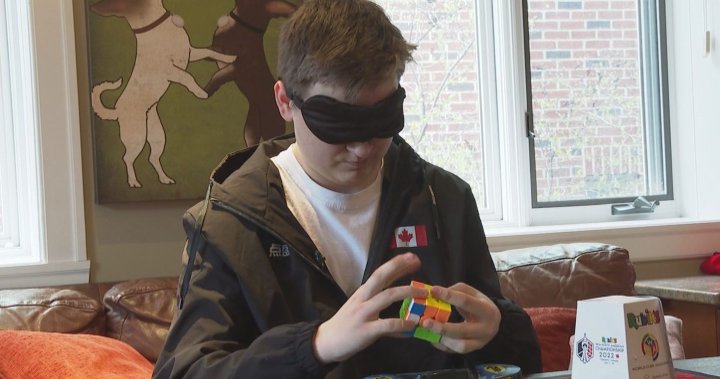Most people have at some point fiddled around with a Rubik’s Cube.
The colourful puzzle has become a staple of many a childhood toy box. Some might even remember with pride how they managed to solve the whole cube — if only even once in their life.
Now imagine not only solving the cube, but doing it as fast as you can with your eyes blindfolded.
That’s how 18-year-old Elliott Kobelansky likes to solve his 3×3 puzzles and he’s fast — world-record-holding kind of fast.
The Montrealer accomplished the feat over the weekend, clocking an average of 15.05 seconds over three tries.
The World Cube Association’s Instagram recognized Kobelansky as the world-record holder for the fastest average solve in the 3×3 blindfolded category.
While Kobelansky was pretty chuffed with his recent accomplishment, he’s thinking of maybe trying to branch out.
“I would like to break the single-solve record eventually. That’s around 12.8 seconds,” he said, adding there are other potential bests he hopes to set, including solving cubes that are 4×4 rows, 5×5 and multiple cubes.
“So lining them all up, memorizing all of them, putting on the blindfold and solving all of them,” he explained of the multiple cubes category.
Currently, Kobelansky holds the Canadian record in all those categories, but dreams of one day becoming the best in the world.
Kobelansky lights up when he talks about cubing. And while he says he’s enjoyed puzzles since he was a kid, the time component added a bit of a thrill.
“A Rubik’s Cube is a perfect puzzle,” he said. “And I discovered a world of not only solving a puzzle but solving it as fast as possible.”
Kobelansky said he uses a method whereby he converts the cube into roughly 20 letters that he memorizes using phonetic tricks.
“After I get those letters, the entire cube is memorized. I put on the blindfold and I don’t have to look again,” he said.
More on Entertainment
“Then I go through each of those letters or each pair of two letters and I have a certain set of moves that will solve those two letters. What that is actually doing, is solving two pieces at a time, and after I get through those 20 letters the cube should be solved.”
It’s a well-known method in the world of cubing, having been developed around 25 years ago.
“It was invented by people doing some graduate work in mathematics or something,” Kobelansky said. “It’s existed for a while. But obviously, like anything, it’s gone through a lot of optimization and tricks were added so it kept on getting faster.”
Kobelansky is eyeing the world championships in Seoul this upcoming August, but in the meantime there is plenty to do to keep busy.
He is in his second year at Marionopolis College working towards a double certification in music and pure and applied sciences.
“I’ll be doing a third year because of the double DEC and then I hope to go to a good university and do computer science or software engineering,” he said.
He believes his background in cubing has helped him develop skills like problem-solving that he can transfer over to other areas of his life.
“Just having some sort of idea of what you want to do and sort of road mapping it and going through the process of solving all those problems,” he said.
“What cubing has done is taught me to practice and how to learn something effectively that really applies to anything I want to do.”
© 2023 Global News, a division of Corus Entertainment Inc.



